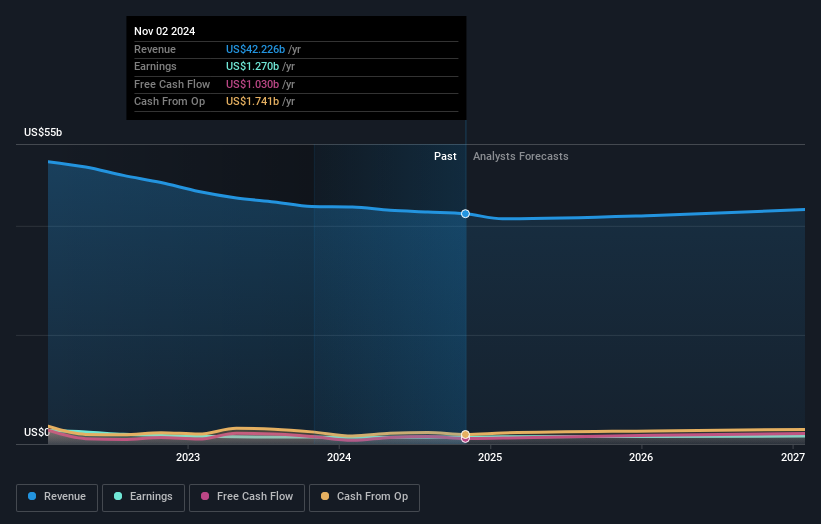- United States
- /
- Specialty Stores
- /
- NYSE:BBY
What Does Best Buy Co., Inc.'s (NYSE:BBY) Share Price Indicate?

Let's talk about the popular Best Buy Co., Inc. (NYSE:BBY). The company's shares received a lot of attention from a substantial price movement on the NYSE over the last few months, increasing to US$103 at one point, and dropping to the lows of US$86.51. Some share price movements can give investors a better opportunity to enter into the stock, and potentially buy at a lower price. A question to answer is whether Best Buy's current trading price of US$89.80 reflective of the actual value of the large-cap? Or is it currently undervalued, providing us with the opportunity to buy? Let’s take a look at Best Buy’s outlook and value based on the most recent financial data to see if there are any catalysts for a price change.
View our latest analysis for Best Buy
Is Best Buy Still Cheap?
According to our price multiple model, which makes a comparison between the company's price-to-earnings ratio and the industry average, the stock price seems to be justfied. In this instance, we’ve used the price-to-earnings (PE) ratio given that there is not enough information to reliably forecast the stock’s cash flows. We find that Best Buy’s ratio of 15.18x is trading slightly below its industry peers’ ratio of 17.01x, which means if you buy Best Buy today, you’d be paying a reasonable price for it. And if you believe Best Buy should be trading in this range, then there isn’t much room for the share price to grow beyond the levels of other industry peers over the long-term. So, is there another chance to buy low in the future? Given that Best Buy’s share is fairly volatile (i.e. its price movements are magnified relative to the rest of the market) this could mean the price can sink lower, giving us an opportunity to buy later on. This is based on its high beta, which is a good indicator for share price volatility.
Can we expect growth from Best Buy?

Investors looking for growth in their portfolio may want to consider the prospects of a company before buying its shares. Although value investors would argue that it’s the intrinsic value relative to the price that matter the most, a more compelling investment thesis would be high growth potential at a cheap price. With profit expected to grow by a double-digit 16% over the next couple of years, the outlook is positive for Best Buy. It looks like higher cash flow is on the cards for the stock, which should feed into a higher share valuation.
What This Means For You
Are you a shareholder? BBY’s optimistic future growth appears to have been factored into the current share price, with shares trading around industry price multiples. However, there are also other important factors which we haven’t considered today, such as the track record of its management team. Have these factors changed since the last time you looked at BBY? Will you have enough confidence to invest in the company should the price drop below the industry PE ratio?
Are you a potential investor? If you’ve been keeping tabs on BBY, now may not be the most optimal time to buy, given it is trading around industry price multiples. However, the optimistic forecast is encouraging for BBY, which means it’s worth diving deeper into other factors such as the strength of its balance sheet, in order to take advantage of the next price drop.
Since timing is quite important when it comes to individual stock picking, it's worth taking a look at what those latest analysts forecasts are. So feel free to check out our free graph representing analyst forecasts.
If you are no longer interested in Best Buy, you can use our free platform to see our list of over 50 other stocks with a high growth potential.
Valuation is complex, but we're here to simplify it.
Discover if Best Buy might be undervalued or overvalued with our detailed analysis, featuring fair value estimates, potential risks, dividends, insider trades, and its financial condition.
Access Free AnalysisHave feedback on this article? Concerned about the content? Get in touch with us directly. Alternatively, email editorial-team (at) simplywallst.com.
This article by Simply Wall St is general in nature. We provide commentary based on historical data and analyst forecasts only using an unbiased methodology and our articles are not intended to be financial advice. It does not constitute a recommendation to buy or sell any stock, and does not take account of your objectives, or your financial situation. We aim to bring you long-term focused analysis driven by fundamental data. Note that our analysis may not factor in the latest price-sensitive company announcements or qualitative material. Simply Wall St has no position in any stocks mentioned.
About NYSE:BBY
Best Buy
Offers technology products and solutions in the United States, Canada, and internationally.
Flawless balance sheet, undervalued and pays a dividend.
Similar Companies
Market Insights
Community Narratives



